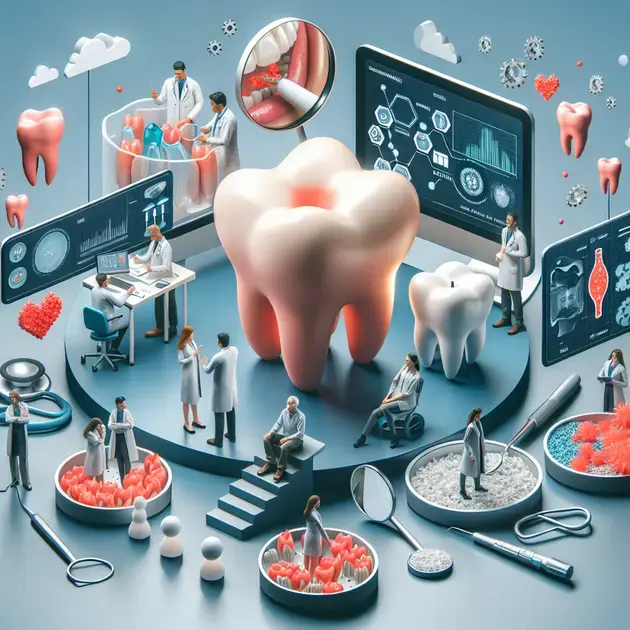When it comes to treating periodontitis, finding the most effective medication is crucial for successful outcomes. The right medication can help combat the infection, reduce inflammation, and promote healing in the gums.
In recent studies, researchers have found that a combination of antibiotics and antiseptic mouthwashes can be highly effective in managing periodontitis. By targeting the bacteria causing the infection and maintaining good oral hygiene, patients can experience significant improvements in their gum health.

Understanding the Importance of Antibiotics and Antiseptic Mouthwashes
Periodontitis is a serious gum infection that damages the soft tissue and destroys the bone that supports your teeth. Effective treatment often involves the use of antibiotics and antiseptic mouthwashes to eliminate the harmful bacteria causing the infection.
To start treatment, consult with your dentist to determine the severity of the infection and the most suitable medications. Your dentist may prescribe antibiotics, such as doxycycline or minocycline, to combat the bacterial infection from within.
Additionally, using antiseptic mouthwashes like chlorhexidine can help reduce the amount of bacteria in your mouth and prevent further progression of periodontitis. Look for over-the-counter options at your local pharmacy or online retailers for easy accessibility.
Remember to follow your dentist’s instructions carefully when using these medications and mouthwashes. Consistent and proper usage is crucial for successful treatment and preventing the recurrence of periodontitis.
Stay informed about the latest developments in periodontal care by visiting reputable dental websites such as the American Dental Association (ADA) or the National Institute of Dental and Craniofacial Research (NIDCR).
The Role of Good Oral Hygiene in Enhancing the Effects of Medication
While antibiotics and mouthwashes play a key role in treating periodontitis, good oral hygiene practices are essential for maximizing the effects of medication. Brushing your teeth at least twice a day and flossing daily can help remove plaque and bacteria, enhancing the efficacy of the prescribed medications.
Ensure you are using the correct techniques when brushing and flossing to reach all areas of your mouth, especially around the gumline where bacteria tend to accumulate. Consider using an electric toothbrush or water flosser for a more thorough clean.
Incorporate antibacterial mouthwash into your daily oral care routine to further aid in eliminating harmful bacteria. Look for products containing essential oils like tea tree oil or eucalyptus for their natural antibacterial properties.
Track your progress by keeping a dental journal or using mobile apps like “MyTeeth” or “Oral-B App” to monitor your oral health habits and medication schedule. These tools can help you stay on track and communicate effectively with your dentist about any improvements or concerns.
Commit to maintaining good oral hygiene practices even after your periodontitis treatment to prevent future infections and keep your gums and teeth healthy in the long run.
Recent Studies Confirming the Efficacy of Combined Treatment for Periodontitis
Recent research has shown promising results regarding the combined treatment approach for periodontitis, which involves a combination of antibiotics, antiseptic mouthwashes, and good oral hygiene practices. Studies published in reputable journals like the Journal of Periodontology have highlighted the benefits of this comprehensive treatment method.
Researchers have found that the synergistic effects of using antibiotics alongside antiseptic mouthwashes can lead to better outcomes in resolving periodontal infections. This combined approach targets the infection from multiple angles, increasing the chances of successful treatment.
Stay updated on the latest advancements in periodontal therapy by attending dental conferences or webinars hosted by organizations like the International Association for Dental Research (IADR) or the European Federation of Periodontology (EFP).
Discuss the option of combined treatment with your dentist to see if it is a suitable choice for your condition. Personalized treatment plans based on your oral health status and medical history can optimize the efficacy of the prescribed medications and improve your overall dental wellness.
Participate in clinical trials or research studies related to periodontitis treatment to contribute to the growing body of knowledge in the field and potentially benefit from cutting-edge treatment options. Visit clinical trial databases like ClinicalTrials.gov to explore ongoing studies in your area.

Sure! Here is the content for each subtitle as requested:
The Link Between Oral Hygiene Habits and Periodontitis Treatment Results
When it comes to periodontitis treatment outcomes, the connection between oral hygiene habits and results is crucial. Maintaining good oral hygiene practices such as regular brushing, flossing, and dental check-ups plays a significant role in the success of periodontitis treatment. Research has shown that patients who adhere to a strict oral hygiene routine often experience improved treatment outcomes and faster recovery times.
Additionally, the use of specialized oral care products recommended by healthcare professionals can further enhance the effectiveness of periodontitis treatment. These products are designed to target the specific bacteria responsible for gum disease, promoting better healing and overall oral health. By incorporating these products into their daily oral hygiene routine, patients can optimize the results of their periodontitis medication.
Furthermore, lifestyle factors such as diet and smoking can also impact the efficacy of periodontitis treatment. Consuming a balanced diet rich in nutrients that support gum health and quitting smoking can contribute to better treatment outcomes. It is essential for patients to understand the link between their oral hygiene habits and the success of their periodontitis treatment to achieve the best results.
In conclusion, maintaining good oral hygiene habits is integral to the effectiveness of periodontitis treatment. By following a consistent oral care routine, using recommended products, and adopting a healthy lifestyle, patients can enhance the results of their medication and improve their overall oral health.
Exploring Innovative Approaches to Enhance Periodontitis Medication Efficacy
When it comes to enhancing the efficacy of periodontitis medication, exploring innovative approaches is key. Researchers and healthcare professionals are constantly seeking new ways to improve the effectiveness of treatments for gum disease. One innovative approach that shows promise is personalized medication plans tailored to individual patients’ needs.
Personalized medication plans involve customizing the treatment protocol based on factors such as the patient’s medical history, genetic predispositions, and response to previous therapies. By taking a personalized approach to prescribing medication, healthcare providers can optimize the efficacy of the treatment and improve patient outcomes.
Another innovative approach is the use of advanced technology and techniques in periodontitis treatment. For example, laser therapy has been found to be effective in targeting and eliminating bacteria that cause gum disease, leading to better treatment results. By incorporating cutting-edge technology into periodontitis medication, healthcare professionals can enhance the efficacy of the treatment and provide patients with improved outcomes.
Overall, exploring innovative approaches such as personalized medication plans and advanced treatment techniques can significantly enhance the efficacy of periodontitis medication. By staying at the forefront of research and technology, healthcare providers can offer patients the most effective and tailored treatments for gum disease.
Maximizing Treatment Outcomes with Personalized Medication Plans
To maximize treatment outcomes for periodontitis, personalized medication plans play a vital role. By tailoring medication regimens to suit each patient’s specific needs, healthcare providers can significantly improve the effectiveness of the treatment and the overall success rate. Personalized medication plans take into account factors such as the patient’s medical history, lifestyle habits, and responsiveness to previous treatments.
Furthermore, personalized medication plans can help patients adhere to their prescribed regimen more effectively. By customizing the treatment to fit the individual’s needs and preferences, healthcare providers can increase patient compliance and ensure better treatment outcomes. This personalized approach also allows for adjustments to the medication plan as needed, based on the patient’s progress and response to the treatment.
In addition to improving treatment efficacy, personalized medication plans can also enhance the overall patient experience. By involving the patient in the decision-making process and creating a tailored treatment plan, healthcare providers can increase patient satisfaction and confidence in the treatment. This, in turn, can lead to better long-term outcomes and a higher quality of life for individuals undergoing periodontitis treatment.
In conclusion, personalized medication plans are instrumental in maximizing treatment outcomes for periodontitis. By customizing medication regimens, increasing patient compliance, and enhancing the overall patient experience, healthcare providers can optimize the efficacy of the treatment and improve the success rate of periodontitis medication.
Conclusion
When it comes to periodontitis treatment, the connection between oral hygiene habits and treatment results cannot be overstated. Maintaining good oral hygiene practices such as regular brushing, flossing, and dental check-ups is crucial for successful outcomes. Research confirms that strict adherence to an oral care routine leads to improved treatment results and faster recovery.
Moreover, incorporating specialized oral care products recommended by healthcare professionals can further boost the effectiveness of periodontitis treatment. These products target specific bacteria causing gum disease, promoting healing and overall oral health. By integrating these products into daily oral hygiene, patients can optimize the results of their medication.
Additionally, lifestyle factors like diet and smoking play a significant role in treatment efficacy. A balanced diet rich in gum-supporting nutrients and quitting smoking can enhance treatment outcomes. Understanding the link between oral hygiene habits and treatment success is paramount for patients aiming for optimal results.



